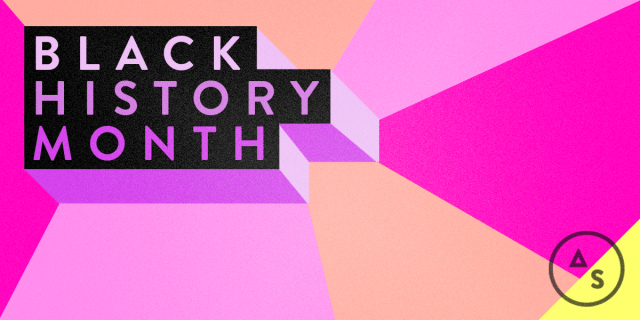
Black History Month 2018 is in full swing! Some of black writers on staff at Autostraddle decided to get together and ask, what does this month mean to us as queer and trans black people?
Our resulting conversation was incredibly fruitful, so we turned it into a special edition roundtable series that we are very excited to share with you! For Part One, we focused on the ways we were taught black history as children, how we interact with that history now as adults, and overall asking ourselves, “What does it mean to ‘queer Black History Month’ and our engagement with it”? The second installment of the series, looking at our hopes for black queer futures, will be published later in February.
Neesha, Staff Writer
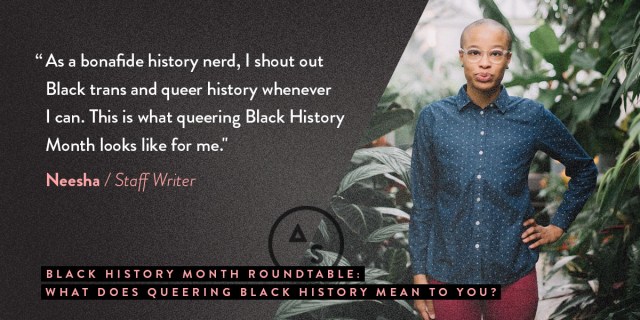
While I celebrate Black History 24-7/ 365 now, I had much less Black Pride as a child. I was surrounded by white kids in my gifted classes, so I became extremely whitewashed. Since I didn’t see myself reflected in these classes, I thought perhaps Blackness didn’t measure up to whiteness. As an adult, I learned that this Black erasure was because of the pervasive institutional racism in my Coastal Georgia hometown, where the Old South was glorified. My white best friend’s dad had an entire room dedicated to the Confederacy, complete with Gone with the Wind paraphernalia.
Today, most people would describe me as Blackity Black Black because I’m vocal about being Black and proud as a longtime community organizer and activist for racial justice. On my left forearm, I bear a Red, Black, and Green tattoo that I rarely get to show off because I live in forever rainy Seattle.
I’m blessed to celebrate Black History Month with my partner, who’s an awe-inspiring Rwandese immigrant femme. Our cultures are the same but different, which I find really beautiful. Black History Month is a chance for me to investigate my own anti-Blackness because, yes, Black folks can still perpetuate anti-Blackness. I’m reminded during this month to actively mitigate the privileges that I have within Black spaces, such as being college-educated and lighter-skinned.
I’m ⅓ of High Femme Podcast, and our January episode, recorded on Martin Luther King Jr. Day, is dedicated to three amazing Black LGBTQ ancestors: Marsha P. Johnson, Audre Lorde, and Bayard Rustin. We lifted them up during our regular “Black Queerstory” segment. In the past, I’ve shared the stories of Pauli Murray and the Combahee River Collective on this segment. As a bonafide history nerd, I shout out Black trans and queer history whenever I can. This is what queering Black History Month looks like for me.
We should at least have a holiday to honor Black LGBTQ heroes specifically. We deserve this type of representation. We need more trans, non-binary, and queer Black archivists documenting our past and present. I’d love to see even more efforts to ensure that our histories are being preserved online and offline for future generations. Black trans and queer kids often grow up feeling alone and unseen with so few historical figures to model themselves after. Uncovering Black LGBTQ history saves lives.
Alexis, Staff Writer
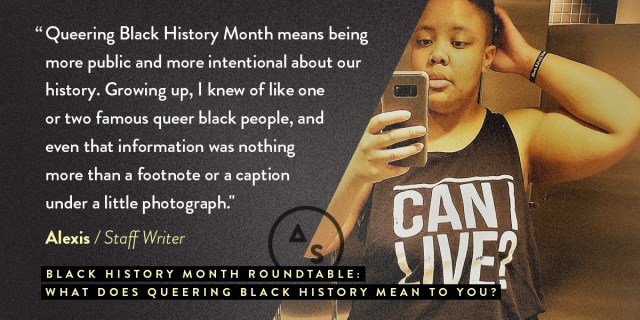
Every time I think of Black History Month, I think of that one episode of The Proud Family where Oscar Proud is in the kitchen wearing kente cloth, trying to get his family hyped for the month:

before doing an aside to the audience:
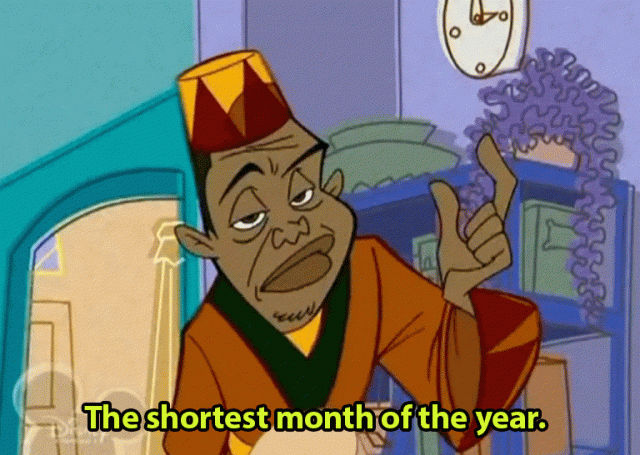
Celebrating black history feels like existing in the only community that can really understand me and taking pride in them. It’s like when Black Twitter does the Thanksgiving hashtag — I understand all the jokes and remember my childhood in a way I couldn’t in high school, a predominantly white girls’ school. It’s an extended feeling of livetweeting Black Lightning and screaming about Black Panther months before it even comes out. It feels like when I go see a black movie at midnight with an all black audience and the feeling of “this is right” I get. It feels like home.
Queering Black History Month means being more public and more intentional about our history. Growing up, I knew of like one or two famous queer black people, and even that information was nothing more than a footnote or a caption under a little photograph. Now I know how to better look for the information about our history that people have tried to bury. The internet is amazing for this; it makes our history more accessible. Spaces like Twitter allow me to find other people, people who know more about the information I lack and are generously willing to teach others. Queering black history also means elevating those voices who are making queer black history now. We must keep that mantra of “if I get over, we all gettin’ over” at the forefront of our work.
My hopes for queer black lives is that we’re safe, we’re no longer forced to live in fear, and we’re able to live our lives so fully that it continues to burst at the seams nearly every moment. I want us to be able to focus on our community, instead of walking around on eggshells knowing white people are looking at us.
I want for us to live by what Toni Morrison said years ago:
“The function, the very serious function of racism is distraction. It keeps you from doing your work. It keeps you explaining, over and over again, your reason for being. Somebody says you have no language and you spend twenty years proving that you do. Somebody says your head isn’t shaped properly so you have scientists working on the fact that it is. Somebody says you have no art, so you dredge that up. Somebody says you have no kingdoms, so you dredge that up. None of this is necessary. There will always be one more thing.”
We will fight ’til we are free and we will find freedom and we will stay in its good graces.
Abeni, Staff Writer
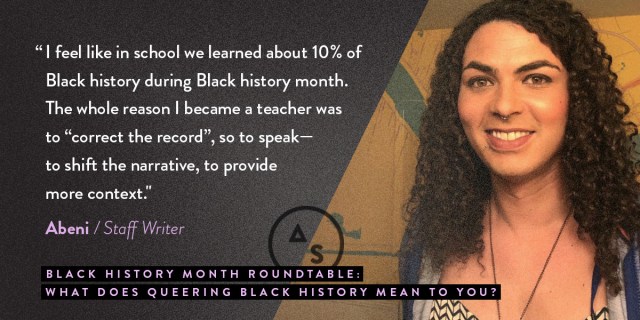
My relationship with Black History Month changed a lot once I became a middle school teacher.
I grew up in a town with no black people other than my father. So the only knowledge of Black history came from him or from school, which had one or two other mixed black kids and that was it. And my dad wasn’t like, super into it — I remember when I learned about Kwanzaa, he scoffed. I used to think he was kind of an Uncle Tom.
I learned later that, because he was born in 1951 and grew up during the civil rights era, he had a very nuanced perspective on the movement. His uncle was Eldridge Cleaver. The increasing “militancy” of certain extended family members created still-unresolved rifts in the family. For my father, success on his own terms meant being self-sufficient, and having the freedom to be himself. That underpinned his understanding of civil rights and liberation — so I guess I understand his perspective a lot more now.
I remember as a student learning about slavery, then that Abraham Lincoln was our savior. Those lessons were followed by Martin Luther King and Rosa Parks, and not much else. According to school, my people emerged on the world stage with slavery, and then we were emancipated and basically immediately integrated into American society. It was much later before I learned what chattel slavery actually entailed, or about Reconstruction and Jim Crow, or that “miscegenation” (interracial relationships) was illegal in most of this country until 1979, the same year my dad married his first wife.
When I became a teacher, I realized I wanted to expand my students’ understandings of Black history. I always did a lesson called “We Didn’t Start with Slavery.” I went deeper into our precolonial history — highlighting many of the African inventions that we now take for granted, like math, or “modern” medicine techniques such as surgery and vaccination. I discussed the major accomplishments of all of the pre-colonial African civilizations. All the stuff I never learned in school. I also collaborated on a lesson with a Latinx co-worker. We went in-depth about the connections between Black folks and Latinx folks. These lessons were particularly important as the majority of my students were Black and Latinx.
One thing about studying pre-colonial Africa, and including that in Black history, is exploring how queer it is. Looking at African politics today, it’s easy for folks to claim that we’re “more homophobic” than white people. However, if you do like five seconds of research, white Western values such as homophobia and transphobia were largely forced upon Africa from their colonizers. I love reading studies that make this plain. Black people have always been “queer” under the white gaze!
As a teacher, I also highlighted a wider variety of civil rights era leaders. I wanted my students to move beyond MLK, but also re-contextualize him, as he’s been completely sanitized, to focus on groups like the Black Panthers (especially since I was teaching in Oakland). I wanted my students to know about people like Kwame Ture, along with queer folks like Bayard Rustin, Marsha P. Johnson, and according to a lot of the latest research, maybe even Malcolm X.
I feel like in school we learned about 10% of Black history during Black history month. The whole reason I became a teacher was to “correct the record,” so to speak — to shift the narrative, to provide more context. Through this, I ended up learning so much Black history that I would have never known if I hadn’t done all of the research and work on my own. Black history will always be relevant in schools as long as we’re still a white supremacist culture. Schools are never going to voluntarily teach us our own history. It’s too empowering.
Carmen, Staff Writer
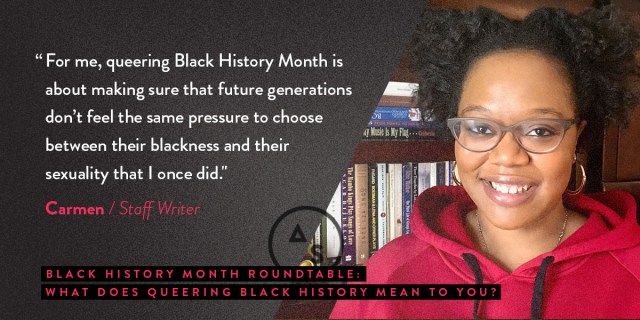
I have always loved Black History Month. I deeply love my blackness and I deeply love black people. I’m not saying that as a unique badge of honor; it’s not like I was given a choice. My parents prioritized that I grow up in environments where blackness was highlighted and reinforced. I was taught to see the beauty in our perseverance, in our shared struggle. I was still a black girl in America, so I received my fair share of subtle (and not-so-subtle) messaging that being black made me inferior. But, in my little pocket of the world I was beautiful, smart, strong, and safe. I was raised to be purposefully, happily, unapologetically black.
Those feelings always become amplified for me in February. It’s trendy in the last few years to write about black accomplishments as “magic” — I mean, hello #blackgirlmagic, right? One secret we don’t share is that our magic was paid for by our ancestors. It came at the price of their blood, their sweat. I think of Black History Month as calling them back into our space. It’s a meditation that because of them, we can. February reminds me to celebrate; it also asks that I stay purposeful, driven, and strive to make good on the sacrifices that those who came before me were forced to make.
As much as I was taught to revere my blackness and honor black history, there were no such messaging about queerness. I had to learn that on my own. I was a freshman in college before I knew that Langston Hughes or James Baldwin were gay, even though I read both writers throughout my childhood. I remember once seeing a poster at some community center; it had pictures of Langston Hughes, Bessie Smith, along with Eleanor Roosevelt, Virginia Wolf, and others underneath the slogan “Sometimes History Sets The Record A Little Too Straight.” The play on words has always stuck with me. The same can be said about blackness — sometimes we like to keep it a ‘lil (or a lot) too straight.
Along the way of my life, I internalized that being gay was for white people. I was a proud black, Afro-Latina woman. I was out in the world, busy kicking ass and taking names; I didn’t believe I could be that and also be gay.
For me, queering Black History Month is about making sure that future generations don’t feel the same pressure to choose between their blackness and their sexuality that I once did. It’s about leaving space to be all of yourself, at once. That starts with re-learning our history and allowing for that history to be messy instead of in neat, separated boxes.
When designing this roundtable, I thought a lot about renowned black lesbian political scientist and activist Cathy Cohen. She’s argued that the word “queerness” is about more than who you sleep with; it’s about creating “a space in opposition to dominant norms.” These new spaces can and should uplift “community as paths to survival, using shared experiences of oppression and resistance to build indigenous resources, shape consciousness, and act collectively.” When it comes to queering Black History Month, upending expected norms and instead making space for community as a resource to our resistance, well you know, that sounds like a pretty good place to start for me.
Natalie, Staff Writer

I was in fourth grade when my frustration with my school’s Black History Month activities reached its peak. After being handed the same handouts about the same people that I’d been given for years, after being recruited to deliver the same portion of Martin Luther King’s “I Have a Dream” speech that I’d done the last two years, I’d had enough. I complained to the teacher — why do we just keep learning about the same people, I lamented — to no avail. It wasn’t a political awakening. It wasn’t the moment nine-year-old Natalie became woke. I was just bored. Even then, I knew there had to be more to Black History than handful of (mostly male) voices we were exposed to every February.
Many years later, those same feelings persist. To be clear, my misgivings about Black History Month have more to do with the practice of it than its existence. I still firmly believe that communities of color need space carved out for their histories to be celebrated. I’d love to imagine that a world in which the stories of people of color are fully integrated into the story we tell about America, but nothing about the story of America suggests that faith would be warranted. If we’ve failed to teach more than 8% of U.S. high school seniors that slavery was the reason the South seceded from the Union, the problem isn’t that Black History Month exists. The problem is that we’re not giving students the full breadth of the black experience in America.
The way we practice Black History Month, particularly in our public schools, can and should change. On a national level, I’m hoping that the Smithsonian National Museum of African American History and Culture (NMAAHC) can begin to shape a more robust curriculum around Black History Month. Using their exhibitions as a guide, the NMAAHC can curate a set of resources for schools that can expose children to the totality of Black History, rather than just the select few heroes that I was taught growing up. Our ancestors are so much more than they’ve ever been given credit for being.
Involving the NMAAHC also ensures that LGBT African-Americans get incorporated into Black History Month narratives; the museum’s been intentional about ensuring our place in African-American history. The museum highlights contributions from Bayard Rustin, Lorraine Hansberry, James Baldwin and Barbara Jordan. It’s also looking to expand its collection to include, among others, Marsha P. Johnson, the Stonewall Riots, and LGBT life during the Harlem Renaissance, which would highlight folks like Ma Rainey, Angelina Weld Grimké and Alice Dunbar-Nelson. The queering of black history has already happened, we just have to find a sustainable way to get the word out.
Technology stands out as one of the best way to democratize Black History Month, both in terms of who gets represented and ease of consumption. Projects like Mic’s newly launched “The Black Monuments Project,” provides an opportunity to learn about black history in your backyard without much effort, but those projects don’t come to fruition without a substantial commitment of time and resources. While a direct investment in black and queer archivists would be ideal, it’s also important to push existing institutions — including black-focused and LGBT-focused spaces — to be intentional about incorporating the stories of QTPOC into their narratives.
On a local level, I’d like to see more people seek out and embrace the black history that lives all around them. What if, instead of being handed another worksheet about George Washington Carver and his many uses of peanuts, my fourth grade teacher had taken our class to what remained of Saint Agnes Hospital, which served for nearly half a century as the only hospital and training school for African Americans between Atlanta and Washington, DC? What about visiting St. Paul AME Church, whose founders were enslaved people, and where the Freedman Convention of 1865 was held? Both locations were a short distance from my classroom, but remained mysteries to me until I grew older.
Admittedly, living in the South — and in North Carolina, in particular —means you’re never too far from a lot of black history, but it really does exist everywhere. Where was your city’s Black Main Street? What were the names of the first black students to integrate your college or university? How many years after Brown v. Board of Education did it take for the schools in your community actually desegregate? It’s liberating to know that the ground you walk on everyday was once touched by your community’s history and I’m remiss that more people (including the 4th grade version of myself) don’t get a chance to experience it.
Reneice, Staff Writer
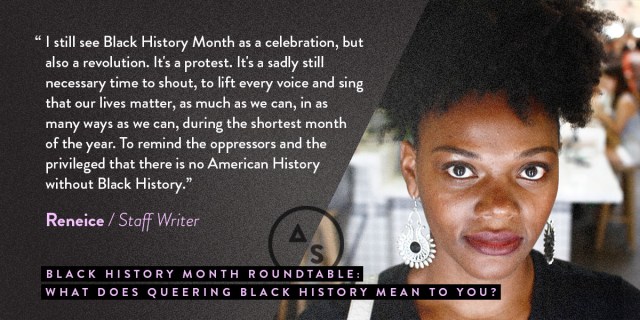
I’ve never thought about my feelings around Black History Month before and now as I try to, I’m realizing that they constantly change. As a child I loved learning about the black people that went unaddressed the rest of the year, but hated the eyes on me, usually the only black kid in class. As a young adult I’d felt that Black History Month was an all out unapologetic celebration of black beauty and experience and excellence. These were my first years having finally escaped WASP territory. I went natural, started to embrace my curves, accept my sexuality, and process all that I’d endured as a minority in white spaces. My feelings have changed with my experience, understanding of myself, and my personal climate.
I still see Black History Month as a celebration, but also a revolution. It’s a protest. It’s a sadly still necessary time to shout, to lift every voice and sing that our lives matter, as much as we can, in as many ways as we can, during the shortest month of the year. To remind the oppressors and the privileged that there is no American History without Black History.
In terms of queering Black History and changing how it’s taught — first and foremost the control of literature and resources used to teach Black History needs to be taken out of the hands of those who are outside of our community. Black history taught from the view of white people is not authentic or acceptable. We already see that in textbooks referring to slaves as happy volunteers; we see that in the way that American children aren’t taught about the Haitian revolution or the culture and current political status of African countries. We see it in the daily rising death toll of Black people, boys who are killed for playing with toys or eating skittles while mobs of unafraid white people can trash an entire city in celebration of a football game and then go home after for a good night’s rest. We need to wash the white influence off our stories and begin again in truth.
Now about queerness; the black community struggles to acknowledge and accept queerness, but so does society at large. It needs to change. Just as black people have always been intertwined to, but left out of American History — queer black people have always been a part of black history. We don’t need to queer black history, it’s already queer because I exist, we exist, and have always existed. Black history is innately queer AF. What we need to do is kick the patriarchy out of the club and it’s far right conservative views handed down to us by slave masters. They can’t dance with us.







